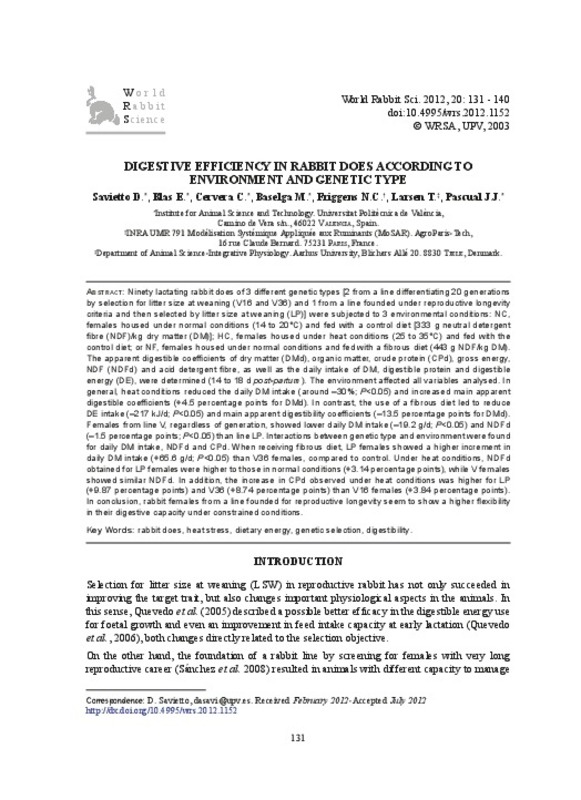JavaScript is disabled for your browser. Some features of this site may not work without it.
Buscar en RiuNet
Listar
Mi cuenta
Estadísticas
Ayuda RiuNet
Admin. UPV
Digestive efficiency in rabbit does according to environment and genetic type
Mostrar el registro sencillo del ítem
Ficheros en el ítem
| dc.contributor.author | Savietto, Davi
|
es_ES |
| dc.contributor.author | Blas Ferrer, Enrique
|
es_ES |
| dc.contributor.author | Cervera Fras, Mª Concepción
|
es_ES |
| dc.contributor.author | Baselga Izquierdo, Manuel
|
es_ES |
| dc.contributor.author | Friggens, Nicolas C.
|
es_ES |
| dc.contributor.author | Larsen, Torben
|
es_ES |
| dc.contributor.author | Pascual Amorós, Juan José
|
|
| dc.date.accessioned | 2012-10-05T11:55:07Z | |
| dc.date.issued | 2012 | |
| dc.identifier.issn | 1257-5011 | |
| dc.identifier.uri | http://hdl.handle.net/10251/17436 | |
| dc.description.abstract | [EN] Ninety lactating rabbit does of three different genetic types [2 from a line differentiating 20 generations by selection for litter size at weaning (lines V16 and V36) and 1 from a line founded under reproductive longevity criteria and then selected by litter size at weaning (line LP)] were subjected to three environmental conditions: NC, females housed under normal conditions (14 to 20oC) and fed with a control diet (333 g NDF/kg DM); HC, females housed under heat conditions (25 to 35oC) and fed with the control diet; or NF, females housed under normal conditions and fed with a fibrous diet (443 g NDF/kg DM). The apparent digestible coefficients of dry matter (DMd), organic matter, crude protein (CPd), gross energy, NDF (NDFd) and acid detergent fibre, as well as the daily intake of dry matter (DM), digestible protein (DP) and digestible energy (DE), were determined (14 to 18 d post-partum). The environment affected all variables analysed. In general, heat conditions reduced the daily feed intake (around -30%; P<0.05) and increased main apparent digestible coefficients (+4.5 percentage points for DMd). In contrast, the use of a fibrous diet led to lower DE intake (-217 kJ/d; P<0.05) and main apparent digestibility coefficients (-13.5 percentage points for DMd). Females from line V, regardless of generation, showed lower daily DM intake (-19.2 g/d; P<0.05) and NDFd (-1.5 percentage points; P<0.05) than line LP. Interactions between genetic type and environment were found for daily DM intake, NDFd and CPd. When receiving fibrous diet, LP females showed a higher increment in daily DM intake (65.6 g/d; P<0.05) than V36 females, compared to control. Under heat conditions, NDFd obtained for LP females were higher to those in normal conditions (+3.14 percentage points), while V females showed similar NDFd. In addition, the increase in CPd observed under heat conditions was higher for LP (+9.87 percentage points) and V36 (+8.74 percentage points) than V16 females (+3.84 percentage points). In conclusion, rabbit females from a line founded for reproductive longevity seem to show a higher flexibility in their digestive capacity under constrained conditions. | es_ES |
| dc.description.sponsorship | The authors would like to thanks Luis Rodenas, Eugenio Martinez-Paredes and Juan Carlos Moreno for their technical support and to the Spanish Ministry of Education and Science (Project AGL2011-30170-C02-01) for the economic support to conduct this study. | en_EN |
| dc.language | Inglés | es_ES |
| dc.publisher | Editorial Universitat Politècnica de València | es_ES |
| dc.relation.ispartof | World Rabbit Science | |
| dc.rights | Reserva de todos los derechos | es_ES |
| dc.subject | Rabbit does | es_ES |
| dc.subject | Heat stress | es_ES |
| dc.subject | Dietary energy | es_ES |
| dc.subject | Genetic improvement | es_ES |
| dc.subject | Digestibility | es_ES |
| dc.title | Digestive efficiency in rabbit does according to environment and genetic type | es_ES |
| dc.type | Artículo | es_ES |
| dc.date.updated | 2012-10-05T10:24:54Z | |
| dc.identifier.doi | 10.4995/wrs.2012.1152 | |
| dc.relation.projectID | info:eu-repo/grantAgreement/MICINN//AGL2011-30170-C02-02/ES/ESTUDIO DEL SISTEMA INMUNE DE DIFERENTES LINEAS GENETICAS CUNICOLAS Y SU RESPUESTA FRENTE A DESAFIOS PRODUCTIVOS E INFECCIOSOS/ | |
| dc.rights.accessRights | Abierto | es_ES |
| dc.contributor.affiliation | Universitat Politècnica de València. Instituto de Ciencia y Tecnología Animal - Institut de Ciència i Tecnologia Animal | es_ES |
| dc.contributor.affiliation | Universitat Politècnica de València. Departamento de Ciencia Animal - Departament de Ciència Animal | es_ES |
| dc.contributor.affiliation | Universitat Politècnica de València. Escuela Técnica Superior de Ingeniería Agronómica y del Medio Natural - Escola Tècnica Superior d'Enginyeria Agronòmica i del Medi Natural | es_ES |
| dc.description.bibliographicCitation | Savietto, D.; Blas Ferrer, E.; Cervera Fras, MC.; Baselga Izquierdo, M.; Friggens, NC.; Larsen, T.; Pascual Amorós, JJ. (2012). Digestive efficiency in rabbit does according to environment and genetic type. World Rabbit Science. 20(3). https://doi.org/10.4995/wrs.2012.1152 | es_ES |
| dc.description.accrualMethod | SWORD | es_ES |
| dc.relation.publisherversion | https://doi.org/10.4995/wrs.2012.1152 | |
| dc.description.volume | 20 | |
| dc.description.issue | 3 | |
| dc.identifier.eissn | 1989-8886 | |
| dc.contributor.funder | Ministerio de Ciencia e Innovación |








